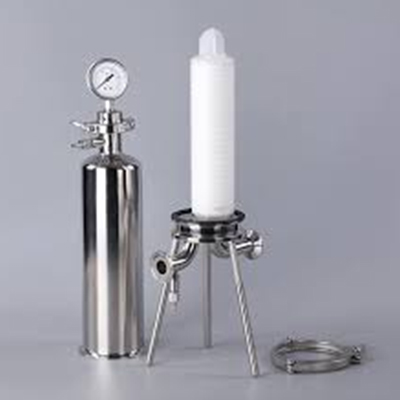Top-Quality Stainless Steel Filter for Maximum Efficiency

Stainless Steel Filter: Benefits, Applications, and Complete Guide
In industries where purity, durability, and efficiency are essential, choosing the right filtration system makes all the difference. One of the most reliable and widely used solutions is the Stainless Steel Filter. Known for its strength, corrosion resistance, and long service life, it is an indispensable component across pharmaceutical, food, chemical, and water treatment industries.
At G. T. Metals and Tubes, we specialize in manufacturing and supplying high-quality stainless steel filters that meet international standards. In this article, we explore everything you need to know about stainless steel filters—their benefits, applications, design considerations, and why they are a smarter investment compared to traditional filters.
Why Stainless Steel Filter is Essential
A stainless steel filter is not just another filtration device; it is a critical tool for ensuring product safety, operational efficiency, and regulatory compliance. Unlike disposable filters, stainless steel filters provide:
-
High durability – Resistant to high pressure and temperature.
-
Corrosion resistance – Especially against harsh chemicals and water.
-
Cost-effectiveness – Longer lifespan reduces replacement costs.
-
Eco-friendliness – Reusable and recyclable, making them a sustainable choice.
Industries that rely on strict hygiene and precision, such as pharmaceuticals and food processing, cannot compromise on filtration quality. This makes stainless steel filters a top choice for mission-critical applications.
Types of Stainless Steel Filters
There are different types of stainless steel filters, each designed for specific industrial requirements. The most common include:
1. Stainless Steel Mesh Filters
These are made using woven wire mesh, ideal for applications requiring precise particle separation. They are commonly used in food, beverages, and chemical industries.
2. Stainless Steel Cartridge Filters
Designed in cylindrical form, these filters are easy to clean and replace. They work well in water treatment and chemical processing applications.
3. Stainless Steel Sintered Filters
Manufactured using powdered stainless steel, sintered filters offer excellent strength, uniform porosity, and high filtration efficiency.
4. Stainless Steel Bag Filters
Bag filters are used for large-volume filtration needs, especially in industries handling bulk liquids.
5. Stainless Steel Disc Filters
These filters are compact, efficient, and suitable for fine filtration in laboratories and small-scale industries.
Choosing the right filter depends on flow requirements, particle size, and industry standards.
Key Advantages of Stainless Steel Filters
Using a stainless steel filter offers multiple advantages compared to conventional filter materials like plastic or fabric.
1. Long Service Life
Stainless steel filters last significantly longer because they can withstand extreme conditions without losing performance.
2. Easy Cleaning and Reusability
These filters can be cleaned easily with backwashing, ultrasonic cleaning, or simple washing methods. This reduces operational downtime.
3. High Strength and Reliability
Stainless steel maintains its shape under pressure, making it suitable for industries that deal with high temperatures and corrosive materials.
4. Better Filtration Accuracy
Fine mesh stainless steel filters can achieve precise particle separation, ensuring product quality and safety.
5. Environmentally Friendly
Since they are reusable and recyclable, stainless steel filters contribute to sustainable manufacturing practices.
Applications of Stainless Steel Filters
The versatility of stainless steel filters makes them useful across a wide range of industries. Some key applications include:
Pharmaceutical Industry
-
Ensures contamination-free drug production.
-
Used in water systems, cleanrooms, and sterile processing.
Food and Beverage Industry
-
Provides hygienic filtration for liquids such as juices, milk, and beer.
-
Prevents contamination and maintains product freshness.
Water Treatment Plants
-
Removes impurities, suspended solids, and bacteria.
-
Essential for municipal and industrial water purification.
Chemical and Petrochemical Industry
-
Handles corrosive fluids and aggressive chemicals.
-
Ensures safe and reliable operations.
Oil and Gas Industry
-
Filters drilling fluids and hydraulic systems.
-
Protects equipment and ensures safety.
Automotive and Engineering
-
Used in lubricating systems, hydraulic systems, and fuel filtration.
From small-scale labs to large industrial plants, stainless steel filters play a key role in protecting products, equipment, and people.
How to Choose the Right Stainless Steel Filter
Selecting the right stainless steel filter depends on various factors. Consider the following before making a decision:
-
Application Requirement – Identify whether it is for water, chemicals, food, or pharmaceuticals.
-
Filtration Level – Choose based on particle size and filtration accuracy.
-
Material Grade – Stainless steel grades like 304 and 316L are commonly used; 316L offers higher corrosion resistance.
-
Operating Conditions – Check for temperature and pressure compatibility.
-
Cleaning and Maintenance – Opt for filters that are easy to sanitize and maintain.
-
Compliance – Ensure the filter meets industry standards such as FDA, WHO, or ISO.
Maintenance of Stainless Steel Filters
Even though stainless steel filters are highly durable, regular maintenance ensures long-term efficiency.
-
Cleaning – Backwashing, ultrasonic cleaning, or chemical cleaning depending on application.
-
Inspection – Regular checks for clogs, cracks, or pressure drops.
-
Replacement of Parts – Though rare, seals or cartridges may require periodic replacement.
-
Documentation – Especially in pharmaceutical and food industries, proper maintenance logs are mandatory.
Proper maintenance reduces downtime and ensures continuous, safe operation.
Why Choose G. T. Metals and Tubes for Stainless Steel Filters
At G. T. Metals and Tubes, we pride ourselves on manufacturing premium-grade stainless steel filters that deliver unmatched performance. Our filters are:
-
Manufactured using high-quality SS 304 and SS 316L.
-
Designed to withstand high pressure and temperature conditions.
-
Available in multiple configurations—mesh, cartridge, sintered, and more.
-
Fully compliant with international quality standards.
-
Tailored to meet the specific needs of diverse industries.
With decades of expertise, we ensure our products meet both technical and regulatory requirements, making us a trusted partner in industrial filtration solutions.
Future Trends in Stainless Steel Filters
The demand for stainless steel filters is expected to rise with advancements in manufacturing and stricter regulations. Future trends include:
-
Smart Filters – Integration of IoT sensors to monitor performance in real-time.
-
Nanotechnology Filtration – Enhancing filtration accuracy at the molecular level.
-
Sustainable Solutions – Greater focus on eco-friendly, energy-efficient filters.
-
Customization – Industry-specific filter designs to meet specialized requirements.
These innovations ensure stainless steel filters remain the gold standard for industrial filtration.
Conclusion
A stainless steel filter is more than just a filtration tool—it is a long-term investment in quality, safety, and sustainability. With superior durability, resistance to corrosion, and precise filtration capabilities, it has become a preferred choice across industries like pharmaceuticals, food processing, water treatment, and chemicals.
At G. T. Metals and Tubes, we deliver stainless steel filters engineered for excellence, ensuring your processes remain efficient, compliant, and reliable. Whether you need mesh, cartridge, or sintered filters, our solutions guarantee performance you can trust.








